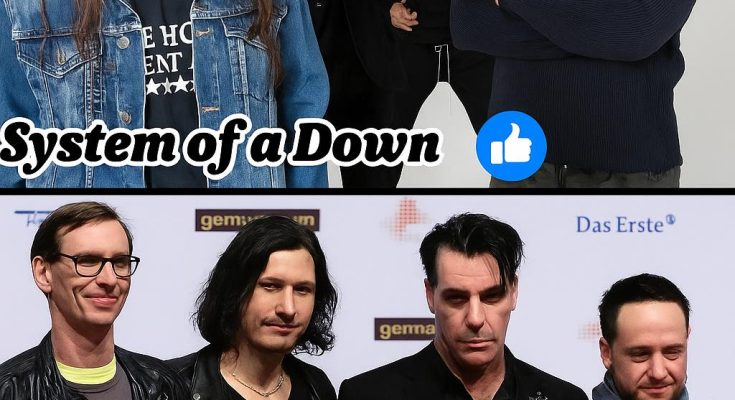Formed in Glendale, California in 1994, the group comprises four Armenian‑American musicians: lead vocalist and keyboardist Serj Tankian, guitarist and co‑vocalist Daron Malakian, bassist and backing‑vocalist Shavo Odadjian, and drummer John Dolmayan. From the start they set themselves apart—not content to simply slam chords and holler screams, they layered their music with an oddball mix of Middle Eastern rhythms, jazz‑influenced time changes, throbbing riffs, political lyrics and a sense of existential anger.
What made them explode onto the world stage was that they tapped into something far more elemental than genre. They rejected the idea of being just “another metal band.” Their 2001 breakthrough album Toxicity (released just a week before the September 11 attacks) arrived into a world already primed for shock‑and‑anger, and the band’s music felt like both a therapeutic scream and a defiant questioning of the times.
The title track and singles like “Chop Suey!” became global anthems—not because they were easily digestible pop songs, but because they were strange, unsettling, cathartic and utterly honest. On “Chop Suey!” one moment the singer is yelping rapid nonsensical syllables, the next he’s singing mournful lines like “Father why have you forsaken me?” in a melody terrifying in its beauty.The effect was jarring and memorable.
At the same time, their lyrics confronted real issues: war, government lies, imprisonment, genocide. The band did not shy away from their Armenian heritage, either. Many of their songs address the genocide of Armenians in the early 20th century, and they used their platform to push for recognition and remembrance. This is far from the typical “party metal” narrative—System of a Down brought a sense of moral urgency and historical weight to heavy music.
Their sound was explosive because it embraced contradictions: beauty and brutality, levity and severity, cultural roots and modern rage. Daron’s guitar riffs could switch from Eastern‑scale flourishes to machine‑gun‑like thrash in seconds. Serj’s voice could morph from wailing prophet to sarcastic comedian. The rhythm section would anchor you one moment, then throw you off with a tempo change or odd time signature the next. Critics recognized this: they noted the band “defied simple classification” and combined pop melodies, jazz, Middle Eastern rhythms, tempo changes, whiplash rock riffs and thought‑provoking lyrics.
But why did this resonate globally? Why did fans across continents latch onto this peculiar mix of metal and lament and politics and identity?
First: authenticity. The band’s Armenian‑American identity wasn’t an accessory—it was foundational. They were children and grandchildren of survivors; they had an outsider perspective on American culture and politics, which allowed them to look at things differently. That outsider status often gives rise to fresh creative perspectives—and for many listeners around the world, it offered someone articulating the unvoiced frustrations of being “in between”: cultural hybrid, globalized, dislocated. Serj once said, “We’re still here, we’re still alive,” in regard to the Armenian genocide.
Second: the universal anger and anxiety of the era. The late‑1990s and early‑2000s were years of rising uncertainty: post‑Cold War, pre‑9/11, the internet expanding, globalization accelerating, identity politics shifting. People felt destabilized. System’s music reflected that tumult—not neatly, not safely, but viscerally. Problems like state power, war profiteering, environmental degradation, loss of self seemed huge, unsolvable; and the band’s music offered a way to feel it, scream it, breathe it out.
Third: musical invention. They didn’t simply parrot the formula of metal. They brought in unexpected influences—lilting Armenian folk modes, odd meter changes, sudden dynamic shifts, humorous asides—even bombastic theatricality. That made their music more than just “heavy”—it was weird and unpredictable and therefore memorable. Critics noted this when the band’s debut album entered the US charts at #124 and yet quickly became “the most talked‑about record of ’98.”
Fourth: activism as part of art. The band aligned themselves with causes—raising awareness of the Armenian genocide, critiquing the prison‑industrial complex (see “Prison Song”), speaking about American militarism (“B.Y.O.B.”). Their music was not detached commentary, but visceral engagement. Through the website Axis of Justice (co‑founded by Serj and activist guitarist Tom Morello) they encouraged fans to become politically active. This gave many fans a sense of purpose: the music wasn’t just mosh‑pit catharsis; it was resistance.
The result is that the band became a global voice for restless youth. Whether you were in Tehran or Lagos or Berlin, if you felt like society was spinning out of control, if you felt marginalized or voiceless, System of a Down gave you soundtracks. Their albums sold millions worldwide. Their hits were played in cuts and compilations across cultures. Their live shows brought together diverse crowds. They didn’t become complacent classics—they remained fierce.
Their career trajectory mirrored this: after their debut in 1998, they released four more studio albums (including the companion pieces Mezmerize and Hypnotize in 2005) and three of those debuted at number one on the US Billboard 200.The album Hypnotize entered the charts at number one with over 320,000 units sold in its first week in the US) After 2006, they went on hiatus but reunited in 2010—and even though they’ve not released a full new album since 2005, they released the two urgent tracks “Protect the Land” and “Genocidal Humanoidz” in 2020 in response to the conflict in Nagorno‑Karabakh, showing that when they choose to speak, they speak loud
Critics often frame their music as both abrasive and accessible, alien and communal. That tension is central: the melody‑laden chorus of “Aerials,” the metallic surge of “Suite Pee,” the sarcastic venom of “Boom!”—these tracks span emotional extremes, giving fans an entry point and a chasm. Many fans note that each album sounded wildly different, yet unmistakably “them.” As one Redditor put it:
He answered his own question: “Because they have a unique sound that contains marketable moments and intrigue as well as a usually clear though often poetic political message.”
What stands out about System of a Down is not that they are simply “popular” but that they became universal without diluting their edge. They are heavy, yet melodic; politically charged, yet emotionally intimate; rooted in Armenian‑American identity, yet global in reach. They channel anger not into nihilism but into questioning; they give voice to frustration not by complaining but by unleashing and, in doing so, uniting.
In many ways, their name says it all. Rumours suggest the original name was “Victims of a Down,” changed to “System of a Down” because it sounded broader, more inclusive, more open to interpretation. (Reddit) “System” could mean government, education, religion, media—all the structures that people feel crushed by. That concept—being under pressure, being angry, being rejected, being ready to break free—resonates everywhere.
To those who felt the system was failing them—whether economic, social, cultural, political—System of a Down became not just a soundtrack, but an anthem. Their music wasn’t just songs to listen to—it was sounds to let out something held inside. To scream at the mirror, to shake a fist, to declare: I am here. I matter. I question. In an era where many felt muzzled or ignored, they gave voice not only to the oppressed, but to the disaffected, the restless, the nonconformist.



